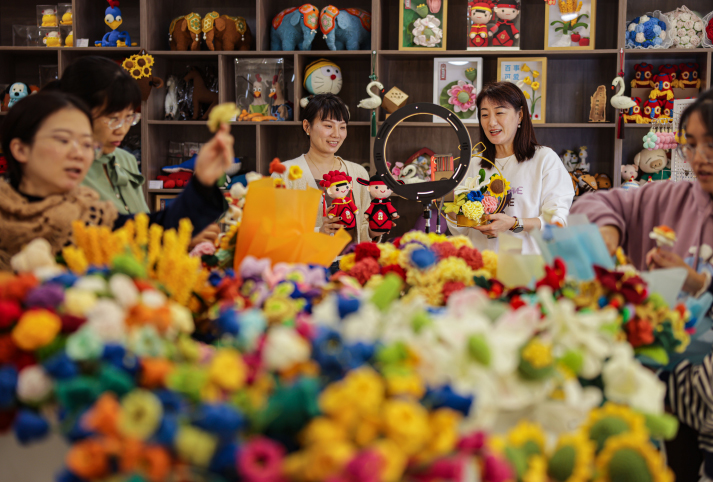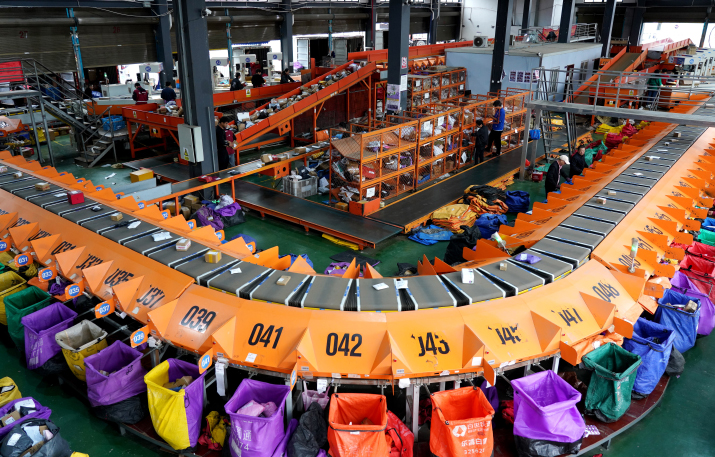| Business |
| Double 11 reflects the changing dynamics of Chinese consumer behavior | |
|
|
 Entrepreneurs promote knitted wool handicrafts and bouquets at a Double 11 livestreaming event from a business incubation center in Rongcheng, Shangdong Province, on November 9 (XINHUA)
Who doesn't love a good bargain? This year marked the 15th anniversary of China's Double 11 online shopping festival, the online equivalent of Black Friday in the United States. Although consumers continued to shop during this year's Double 11, the most talked-about topic was probably the original shopping carnival from 15 years ago. In 2009, Zhang Yong, then newly appointed General Manager of Taobao Mall, part of Chinese tech giant Alibaba Group's first e-commerce platform Taobao.com, known today as the ubiquitous Taobao app, was looking for ways to increase the mall's transaction volume. November 11 was chosen for a one-day event with a site-wide 50 percent discount. Despite the modest participation of only 27 brands, transaction volume on that first Double 11 day reached 52 million yuan ($7.16 million). The following year, it jumped to a staggering 936 million yuan ($128.92 million), heralding the unstoppable Double 11 phenomenon. Over the past 15 years, Double 11 has experienced remarkable growth. In 2018, British newspaper The Mirror reported that Double 11 had surpassed Black Friday to become the world's biggest shopping extravaganza. In 2019, American project management research magazine PM Network announced the top 50 notable and influential projects of the past 50 years in its list of Most Influential Projects. Double 11 earned its place among esteemed projects such as the 1969 Apollo 11 Moon Landing and the Human Genome Project, an international project to study the entire genetic material of a human being—completed in 2003, securing sixth place. From Alibaba's solo act to the entry of e-commerce giants JD.com, the shopping channel on Douyin (the Chinese version of TikTok) and social e-commerce platform Pinduoduo, and from its domestic roots to international prominence, Double 11 has brought about a profound change in China's retail ecosystem. But the once-annual consumer celebration that used to ignite collective joy among consumers and merchants alike seems to have lost the celebratory anticipation that made people wait a year for this very day to come around. Over time, the shopping festival has gradually turned into an everyday routine for people, becoming a familiar normality. Every day is Double 11 As the curtain fell on November 11, major platforms released their performance reports: On Tmall, the new version of Taobao Mall, the transaction volume of 38,000 brands increased by more than 100 percent year on year, with 402 brands reaching 100 million yuan ($13.7 million) in transactions each; on JD.com, more than 60 brands achieved sales of more than 1 billion yuan ($137 million), and the transaction volume of nearly 20,000 brands increased by more than three times year on year; Pinduoduo's "10-billion-yuan ($1.37-billion) subsidy" discount campaign reached a user base of more than 620 million and, partly as a result of the campaign, its order volume from consumers in first-tier cities, who previously preferred established platforms such as Tmall and JD.com, grew 113 percent year on year; Douyin's gross merchandise volume experienced a remarkable 119 percent year-on-year growth. Despite a dazzling array of shopping festivals diverting consumer attention from Double 11, the underlying tone of the performance reports remained festive. The past few years have seen a proliferation of shopping festivals with different themes. Among them are Double 12 on December 12, the 618 Shopping Gala around June 18 and the 818 Fever Shopping Festival on August 18. Beyond collective shopping extravaganzas like Double 11, each platform orchestrates its own shopping events and seasonal promotions. "Double 11 has evolved from its initial status as a nationwide carnival to its present state of normalized shopping behavior," Hong Yong, an associate researcher with the E-Commerce Institute of the Chinese Academy of International Trade and Economic Cooperation, told Beijing Review. "With the continuous hosting of these shopping events, the uniqueness of Double 11 has gradually diminished, leading to a gradual weakening of its festive attributes." The competition among various platforms and the rise of social media and live commerce, a combination of livestreaming and e-commerce, has also snatched away business from traditional shopping festivals, he added. "With increased shopping options, consumers have access to more personalized and differentiated shopping experiences, which has weakened the role of Double 11," Yang Yu, a senior retail analyst and founder of Yilantop.com, an online media brand focusing on consumer goods, told Beijing Review. "The abundance of consumer festivals has led to consumer fatigue," Yang said. Consumer attitudes and habits have begun to evolve. They now prioritize the quality, brand reputation and experience of their purchases over navigating the complexities of different promotions under different banners, he added. The era of Double 11 as a straightforward half-price affair is long gone. In its place is an extended duration of the shopping festival, with consumers often unaware of when it actually begins or ends. Complicated discount mechanisms require consumers to meet specific purchasing criteria for the most economical payment, resulting in the purchase of many unnecessary items. Comments such as "You can't shop on Double 11 if you're not good at math," "After calculating for a long time, I forgot to use the coupon and missed the lowest price," or "Some merchants deceive consumers by first raising prices and then lowering them during festivals" have contributed to a gradual return of consumers to a more rational approach. "With the fierce competition in e-commerce, product prices have become increasingly transparent. Platforms and merchants can no longer afford to directly promote sales in the original half-price format, as no one can withstand the financial pressure that such a strategy entails," Yang said.  Employees work at a logistics center in Yueqing, Zhejiang Province, on November 11 (XINHUA)
A window to new trends Despite the normalization of Double 11, the magnetic pull of discounted prices remains. In this familiar consumer routine, how does the iconic Double 11 shed light on the ever-changing landscape of consumer behavior? This year's Double 11 statistics show that live-commerce shopping has become a burgeoning consumer habit. "This year heralds the beginning of the explosive rise of brand store livestreaming, which has evolved from a tool for Taobao and Tmall merchants to an important business model," said Cheng Daofang, General Manager of Taobao's livestream division. "The rise of brand store livestreaming during Double 11 is a direct reflection of its thriving ecosystem." There are two types of livestreaming rooms. One is run by brands themselves, called a brand store room, and they only sell their own products. The other is a buyer room, where a livestreamer or buyer can select a number of brands and sell their products. According to Taobao, among its 58 livestreaming rooms with a combined transaction volume exceeding 100 million yuan, brand store livestreaming rooms accounted for over 60 percent. According to Alimama, a marketing technology platform within the Alibaba ecosystem, live commerce delivers a remarkable 7 to 11 times higher business increment on average for Taobao and Tmall merchants. Domestic branding was another characteristic of this year's Double 11. Of the 402 brands on Tmall that achieved transactions of more than 100 million yuan, 243 were domestic brands. Domestic brands in the cosmetics and pet food sectors posted an impressive performance. According to investment firm Kaiyuan Securities, among the top 10 brands in cat and dog food sales on Tmall, domestic brands hold seven seats, while international brands hold three. According to JD.com, consumers born in the 1990s and 2000s accounted for 62 percent of consumption expenditure on domestic products, solidifying their role as the absolute driving force behind domestic brand consumption. The emergence of so-called "dopamine consumption" represents a new consumption trend driven by consumers' growing pursuit of happiness. Liu Peng, President of the Brand Development Center of Alibaba's Taotian Group, which includes Taobao and Tmall, emphasized the growing importance consumers attach to emotional aspects. Younger consumers in particular are willing to pay for experiences that bring them joy, as evidenced by this year's Double 11. Trends in dopamine consumption, exemplified by categories such as e-sports, cycling and skiing, are shaping consumer behavior. The "silver economy" (markets that meet senior citizens' needs) and "he economy" (markets targeting male consumption) were two more buzzwords of this year's Double 11. On Taobao, the transaction volume for senior products increased by 2.6 times compared to last year. Additionally, within the first 10 minutes of JD.com launching its campaign, transaction volume for the electric wheelchair category experienced a tenfold surge compared to the same period last year, while the hearing aid category witnessed a fivefold increase. This year, JD.com launched its Double 11 campaign on October 23 (the ninth day of the ninth month on the Chinese lunar calendar), which marks a traditional Chinese festival for senior citizens known as the Double Ninth Festival. The platform also initiated a campaign featuring age-friendly products such as accessible smart toilets and palm recognition smart door locks. "Campaigns targeting seniors on platforms like JD.com are becoming more systematic, and the products more diverse," said Chen Waner, from AgeClub, an industrial platform focusing on business information in the elderly industry for JD.com. According to Tmall, this year's top three items for male consumers are road bicycles, e-sports products and windbreakers, consumption of which increased by 305, 114 and 90 percent year on year, respectively. Remarkably, the growth rates of the top three items for male consumers have, for the first time, surpassed the top three items for pet dogs. This has become a humorous observation among netizens, challenging the stereotypical notion that men need less than pets. The male consumer market has emerged as a new frontier for consumption. Against the backdrop of a rising middle class, intensified mobile Internet integration, an upgrade in personalized demands, and the year-over-year rise in the proportion of single male adults, the he economy is expected to experience long-term and sustainable growth, Fu Yifu, a senior analyst at the Suning Institute of Finance, said in a recent report. A future outlook Over the years, Double 11 has become a reliable indicator of consumer spending trends. Understanding these trends is critical to transforming and improving Double 11, as well as identifying new growth drivers for consumption. So what kind of Double 11 do consumers want? Yang believed that "clean, simple, sincere and gimmick-free" should be the essence of Double 11. Hong said what consumers need is a more rational and personalized shopping spree. "Double 11 needs to transform and upgrade, focusing on providing high-quality products and services to meet consumers' personalized needs and create a more intelligent and convenient shopping experience," Hong said, adding that new growth drivers for consumption in the future could be content e-commerce, or the process of publishing, promoting and distributing content to drive sales, and social media e-commerce. Accounting firm PwC China's most recent domestic consumption survey showed that with the continuous development of e-commerce platforms, the demands of both consumers and brands have become more diversified. For brands, Double 11 is no longer just about meeting sales targets. As business models evolve, the effectiveness of simple methods such as discount promotions to drive sales is gradually diminishing. For consumers, consumption needs are shifting from satisfying basic needs to a higher-dimensional, personalized consumption upgrade. At this new juncture of upgrading and transformation, Double 11 must achieve more breakthroughs to begin the journey from quantitative to qualitative change. BR (Print Edition: Beyond the Buzz) Copyedited by Elsbeth van Paridon Comments to zhangshsh@cicgamericas.com |
|
||||||||||||||||||||||||||||||
|